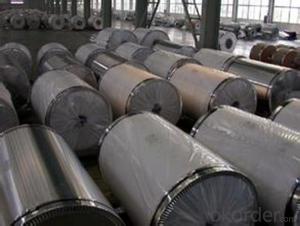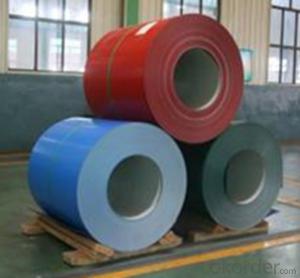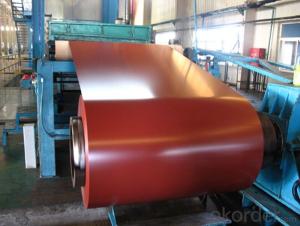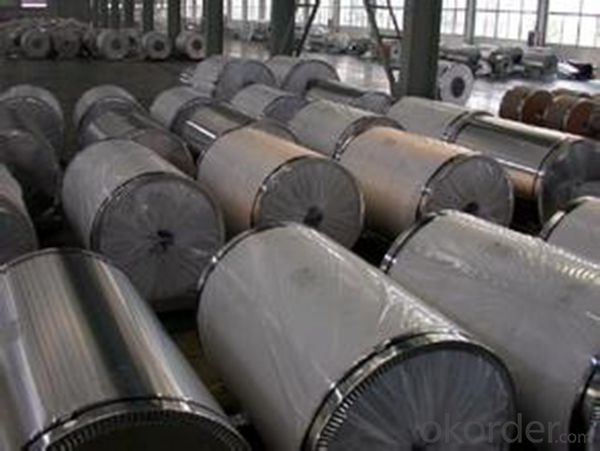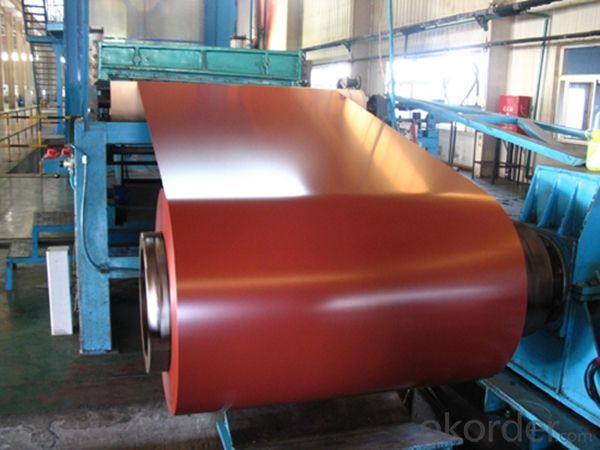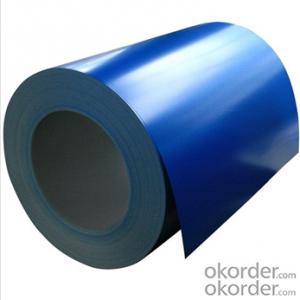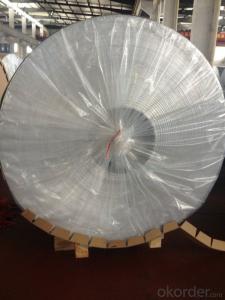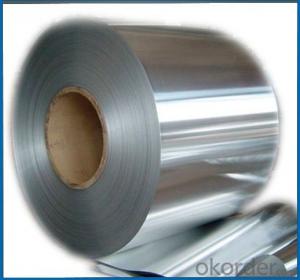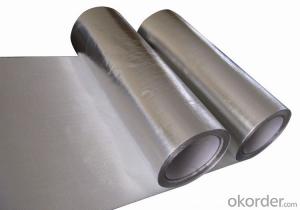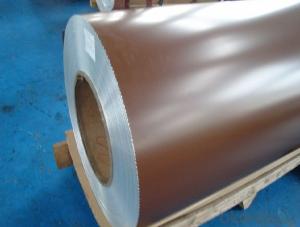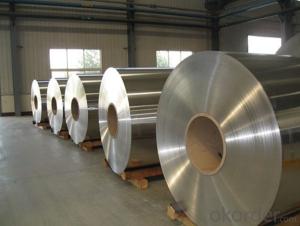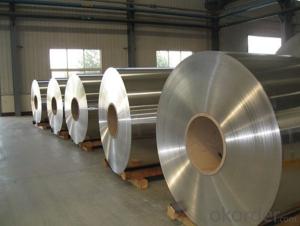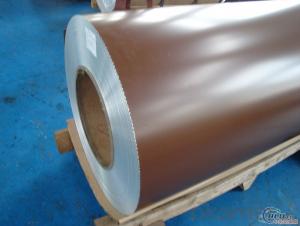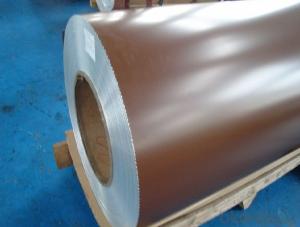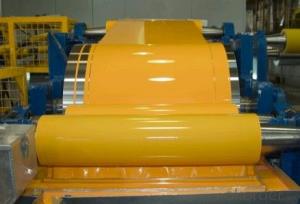Aluminum Coil Toronto - Color Coated 3003 Aluminum Coil China Supply for Sale
- Loading Port:
- Shanghai
- Payment Terms:
- TT OR LC
- Min Order Qty:
- 5 m.t.
- Supply Capability:
- 10000 m.t./month
OKorder Service Pledge
OKorder Financial Service
You Might Also Like
Specification
1. Specification of Color Coated 3003 Aluminum Coil China Supply for Sale
Material | Alloy Aluminum 6063,6061,6005 or customer nominated |
Temper | T3, T4, T5, T6 |
Surface | Anodize, electrophoresis, powder coating, PVDF coating, wood grain painting, matted, etc. |
Colour | Any colour based on Standard Germany RAL Mark |
Length | Coating 6.5 meters, Anodizing 6.5 meters, Mill finish 5 meters |
Press Machine | 500-4000 tons all together 64 press lines. |
Fabrication | 1. Windows and doors; 2. Drilling; 3. Bending; 4. Cutting; 5. etc. |
Certificate | ISO 9001 |
Moulding | 1. Using our moulds, no fee; |
2. Using customer drawing, opening mould, usually about 10~50 tons then the moulding can be refunded. | |
3. Mould cost is negotiable base on the order quantity | |
Capability | Annual output 100,000 tons |
2. Application of Color Coated 3003 Aluminum Coil China Supply for Sale
(1).Interior: wall cladding, ceilings, bathrooms, kitchens and balconies, shutters, doors...
(2).Exterior: wall cladding, facades, roofing, canopies, tunnels,column covers , renovations...
(3).Advertisement: display platforms, signboards, fascia, shop fronts...
3. Feature of Color Coated 3003 Aluminum Coil China Supply for Sale
*Such coil is specially designed to replace aluminum ingot, due to the high export tax of aluminum ingot, the coil has better price than ingot.
*This type of coil can fit customer's remelting furnace just like ingot, no need to make any change to the production line that was previously used for ingot. The standard coil size and weight is very suitable for the feed gate of furnace.
*This type of coil causes less material wastage than ingot when remelted.
*Our coil is made directly from ore, no need to go though the ingot making process, quality is much better than other suppliers who use ingot scrap to make coil.
Be free from Oil Stain, Dent, Inclusion, Scratches, Stain, Oxide Dicoloration, Breaks, Corrosion, Roll Marks, Dirt Streaks and other defect which will interfere with use
4. Certificate:
SGS and ROHS(if client request, paid by client), MTC(plant provided), Certificate of Origin(FORM A, FORM E, CO), Bureau Veritas and SGS (if client request, paid by client), CIQS certificate
5. Image of Color Coated 3003 Aluminum Coil China Supply for Sale
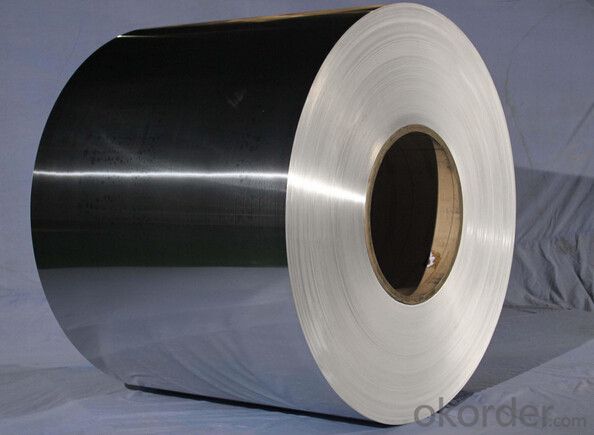
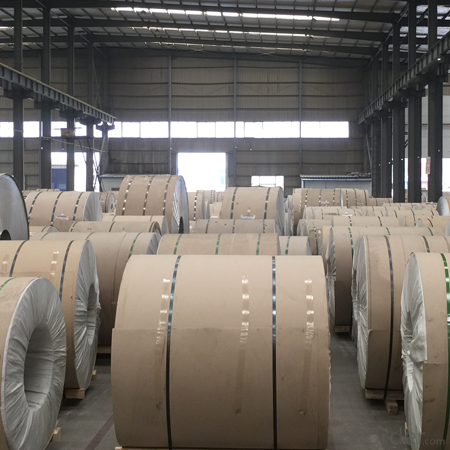
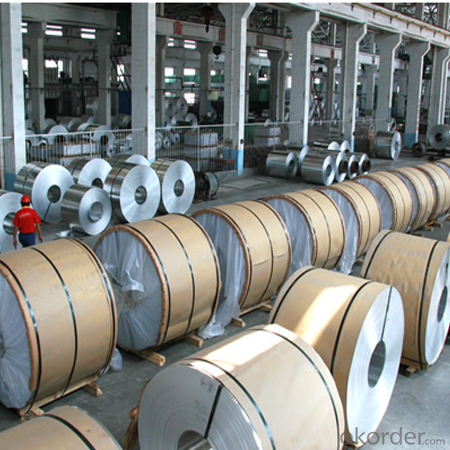
6. Package and shipping of Color Coated 3003 Aluminum Coil China Supply for Sale
eye to wall
eye to the wall
with wood pallet (wooded case also available)
7. FAQ
1) What is the delivery time?
Dpends on actual order, around 20 to 35 days
2)What is the QC system:
We have QC staff of 20 persons and advanced equipment, each production is with MTC traced from Aluminum ingot lot.
3) What market do you mainly sell to?
Australia, America, Asia, Middle East, Western Europe, Africa etc
- Q: Are aluminum coils suitable for architectural applications?
- Yes, aluminum coils are commonly used in architectural applications due to their durability, lightweight nature, corrosion resistance, and versatility in design options. They are often used in roofing, siding, facades, and other architectural elements, offering a long-lasting and aesthetically pleasing solution.
- Q: What are the common joining techniques used for aluminum coils?
- Aluminum coils can be joined using various techniques, including welding, adhesive bonding, mechanical fastening, and soldering. When it comes to joining aluminum coils, welding is a widely used technique. Different welding methods, such as gas tungsten arc welding (GTAW or TIG), gas metal arc welding (GMAW or MIG), and laser welding, can be employed. These methods fuse the aluminum coils together, providing a strong and durable joint that ensures structural integrity. Another technique for joining aluminum coils is adhesive bonding. This method involves applying a suitable adhesive or bonding agent to join the coils. Adhesive bonding offers excellent flexibility, allowing for the joining of dissimilar materials and creating a smooth, aesthetically pleasing surface. It also distributes stress evenly across the joint, reducing the risk of fatigue failure. Mechanical fastening is another option for joining aluminum coils. This technique utilizes mechanical elements like bolts, screws, rivets, or clips. It is a relatively simple and cost-effective method, allowing for easy disassembly if needed. Mechanical fasteners provide good strength and stability, although periodic maintenance may be required to prevent loosening over time. Soldering is a low-temperature alloy-based technique for joining aluminum coils. It involves heating the solder to its melting point and allowing it to flow into the joint, creating a strong bond. Soldering is commonly used for electrical connections or delicate applications where excessive heat can damage the aluminum. However, it may not offer the same level of strength as welding or mechanical fastening. The choice of joining technique for aluminum coils depends on various factors, including specific application requirements, desired strength, appearance, and cost considerations.
- Q: Is it possible to utilize aluminum coils in the manufacturing process of solar panels?
- <p>Yes, aluminum coils can be used in the production of solar panels. Aluminum is a common material used in solar panel frames due to its lightweight, high strength, and excellent heat dissipation properties. It also offers good resistance to corrosion, which is crucial for outdoor applications. Aluminum coils are often chosen for their ease of manufacturing and cost-effectiveness, making them a suitable choice for constructing the frame or support structure of solar panels.</p>
- Q: just wondering if you can weld aluminum pipe to a metal pipe for a cars exuast
- aluminum to steel? short answer No and you will end up with a lot of mess and splatter try J-B weld it's a product though it can be done with a certain process that I'm not familiar with I have seen the finished application but i think the aluminum is a different metal make up I have accidentally tried to weld the two together many times not realizing what the metals were use a magnet to test if its aluminum magnets wont stick to aluminum
- Q: I was wandering, if your spear's shaft is made of aluminum, does that have any strength to it, i mean, say you had to block with the shaft, would a weapon break through like your basic sword or basic axe, i don't mean big heavy swords and axes, but like average ones, could it break through an aluminum shaft of a spear?
- From my understanding aluminum weapons are only for exhibitions and never for anything close to real, let alone impact. Aluminum can be a strong/durable metal, but in the end it can hardly hold up against wood like pine, let alone oak. There's also here-say about aluminum shattering. I don't really know what that's about, but I have heard a rumor that about some doing so, whatever the extend of shattering really means. I wouldn't bother with aluminum when there's very fine woods that can be used instead. Aluminum is also cheap and it's said you get what you pay for. Personally, I'd forget aluminum and go with a hard wood.
- Q: How are aluminum coils stored in a warehouse?
- Aluminum coils are typically stored in a warehouse by stacking them vertically or horizontally, depending on the size and weight of the coils. They are often placed on pallets or racks to maximize storage space and ensure stability. Additionally, protective packaging materials, such as plastic or cardboard, may be used to prevent damage and maintain the integrity of the coils during storage.
- Q: How do aluminum coils compare to galvanized steel coils in terms of longevity?
- In terms of longevity, aluminum coils generally have a longer lifespan compared to galvanized steel coils. Aluminum is naturally resistant to corrosion, which means it is less likely to rust or deteriorate over time. This makes aluminum coils a popular choice for outdoor applications, such as in roofing, siding, and HVAC systems, as they can withstand harsh weather conditions without losing their structural integrity. On the other hand, galvanized steel coils are steel coils that have been coated with a layer of zinc to protect against corrosion. While this zinc coating provides some level of protection, it can wear off over time, particularly in areas with high humidity or exposure to saltwater. Once the zinc coating is compromised, the steel underneath becomes susceptible to rust and corrosion, which can significantly reduce the lifespan of galvanized steel coils. Therefore, if longevity is a primary concern, aluminum coils are generally a more durable and long-lasting option compared to galvanized steel coils. However, it is important to consider other factors such as cost, specific application requirements, and maintenance needs before making a final decision.
- Q: I have a mig welder, and I would like to learn to weld aluminum. I have been told that I must buy an aluminum wire spool gun, because the standard mig wire feeder gun will not work with aluminum wire. I don't understand why my standard wire feeder will not work. It feeds wire just like a spool gun. Why do I need to spend money on a spool gun just to weld aluminum? If a spool gun is truly necessary, where can i find one for a reasonable price? Thanks for your help!
- NO okorder /
- Q: This question asks about the impact of aluminum coils on food quality, considering possible effects on taste, safety, and preservation.
- <p>Aluminum coils, when used in cooking or food packaging, can potentially affect the quality of food. If aluminum leaches into the food, it may alter the taste and could pose health risks due to aluminum's neurotoxic properties. However, modern food-grade aluminum coils are coated or anodized to prevent such leaching, ensuring food safety. They are also used in heat transfer for cooking, which can improve the efficiency and evenness of cooking, thus enhancing food quality. It's crucial to use high-quality, food-safe aluminum coils to avoid any negative impact on food quality and safety.</p>
- Q: Is it safe to use aluminum coil for storing food?
- <p>Aluminum coil can be used for food storage, but with certain considerations. Aluminum is a good conductor of heat and is often used in cookware, but for long-term food storage, it's not ideal. It's important to ensure that the aluminum is coated or lined with a non-reactive material to prevent direct contact with food, as aluminum can leach into food and may have health implications. Additionally, aluminum is not recommended for acidic foods as it can react with them. For best food storage practices, consider using materials specifically designed for food contact, such as glass or food-grade plastic containers.</p>
Send your message to us
Aluminum Coil Toronto - Color Coated 3003 Aluminum Coil China Supply for Sale
- Loading Port:
- Shanghai
- Payment Terms:
- TT OR LC
- Min Order Qty:
- 5 m.t.
- Supply Capability:
- 10000 m.t./month
OKorder Service Pledge
OKorder Financial Service
Similar products
Hot products
Hot Searches
Related keywords
